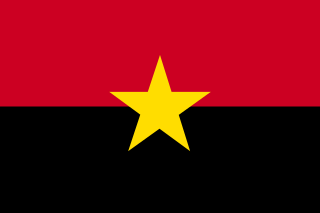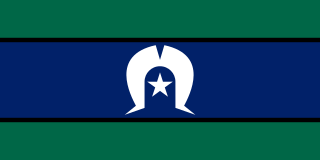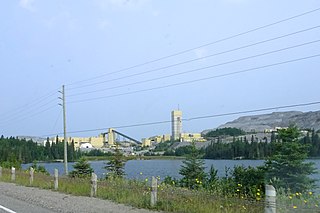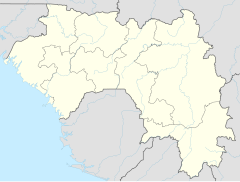
Equatorial Guinea, also rarely known as Equatoguinea, officially the Republic of Equatorial Guinea, is a country on the west coast of Central Africa, with an area of 28,000 square kilometres (11,000 sq mi). Formerly the colony of Spanish Guinea, its post-independence name refers to its location near both the Equator and in the African region of Guinea. As of 2021, the country had a population of 1,468,777, over 85% of whom are ethnically Fang.

Guinea, officially the Republic of Guinea, is a coastal country in West Africa. It borders the Atlantic Ocean to the west, Guinea-Bissau to the northwest, Senegal to the north, Mali to the northeast, Cote d'Ivoire to the southeast, and Sierra Leone and Liberia to the south. It is sometimes referred to as Guinea-Conakry after its capital Conakry, to distinguish it from other territories in the eponymous region such as Guinea-Bissau and Equatorial Guinea. Guinea has a population of 13.5 million and an area of 245,857 square kilometres (94,926 sq mi).

Papua New Guinea, officially the Independent State of Papua New Guinea, is a country in Oceania that comprises the eastern half of the island of New Guinea and its offshore islands in Melanesia. Its capital, located along its southeastern coast, is Port Moresby. The country is the world's third largest island country, with an area of 462,840 km2 (178,700 sq mi).

The International Organization for Migration (IOM) is a United Nations agency that provides services and advice concerning migration to governments and migrants, including internally displaced persons, refugees, and migrant workers.

Human Rights Watch (HRW) is an international non-governmental organization headquartered in New York City that conducts research and advocacy on human rights. The group pressures governments, policymakers, companies, and individual human rights abusers to denounce abuse and respect human rights, and often works on behalf of refugees, children, migrants, and political prisoners.

The Organisation of Islamic Cooperation, formerly the Organisation of the Islamic Conference, is an intergovernmental organization founded in 1969, consisting of 57 member states, with 48 being Muslim-majority countries. The organisation states that it is "the collective voice of the Muslim world" and works to "safeguard and protect the interests of the Muslim world in the spirit of promoting international peace and harmony".
The Amung people are a group of about 17,700 people living in the highlands of the Central Papua province of Indonesia. Most Amungme live in Mimika and Puncak, in valleys like Noema, Tsinga, Hoeya, Bella, Alama, Aroanop, and Wa. A related group live in Beoga Valley, Puncak and they are called Damal people.
The crime of apartheid is defined by the 2002 Rome Statute of the International Criminal Court as inhumane acts of a character similar to other crimes against humanity "committed in the context of an institutionalized regime of systematic oppression and domination by one racial group over any other racial group or groups and committed with the intention of maintaining that regime".

The People's Movement for the Liberation of Angola, for some years called the People's Movement for the Liberation of Angola – Labour Party, is an Angolan left-wing, social democratic political party. The MPLA fought against the Portuguese army in the Angolan War of Independence from 1961 to 1974, and defeated the National Union for the Total Independence of Angola (UNITA) and the National Liberation Front of Angola (FNLA) in the Angolan Civil War. The party has ruled Angola since the country's independence from Portugal in 1975, being the de facto government throughout the civil war and continuing to rule afterwards.

The Torres Strait Islands are a group of at least 274 small islands in the Torres Strait, a waterway separating far northern continental Australia's Cape York Peninsula and the island of New Guinea. They span an area of 48,000 km2 (19,000 sq mi), but their total land area is 566 km2 (219 sq mi).

Barrick Gold Corporation is a mining company that produces gold and copper with 16 operating sites in 13 countries. It is headquartered in Toronto, Ontario, Canada. It has mining operations in Argentina, Canada, Chile, Côte d'Ivoire, Democratic Republic of the Congo, Dominican Republic, Mali, Papua New Guinea, Saudi Arabia, Tanzania, the United States and Zambia. In 2019, it produced 5.5 million ounces of gold at all-in sustaining costs of $894/ounce and 432 million pounds of copper at all-in sustaining costs of $2.52/pound. As of 31 December 2019, the company had 71 million ounces of proven and probable gold reserves.

The Porgera Gold Mine is a large gold and silver mining operation in near Porgera, Enga province, Papua New Guinea (PNG), located at the head of the Porgera Valley. The mine is situated in the rain forest covered highlands at an altitude of 2,200 to 2,700 m, in a region of high rainfall, landslides, and frequent earthquakes.
A talibé is a boy, usually from Senegal, the Gambia, Guinea, Guinea-Bissau, Chad, Mali or Mauritania, who studies the Quran at a daara. This education is guided by a teacher known as a marabout. In most cases talibés leave their parents to stay in the daara.

The Royal Papua New Guinea Constabulary (RPNGC) is a national police force with jurisdiction throughout all of Papua New Guinea.

Equatorial Guinea is known for human rights abuses. Under the current government it has "limited ability of citizens to change their government; increased reports of unlawful murders of civilians by security forces; government-sanctioned kidnappings; systematic torture of prisoners and detainees by security forces; life threatening conditions in prisons and detention facilities; impunity; arbitrary arrest and detention and incommunicado detention; harassment and deportation of foreign residents with limited due process; judicial corruption and lack of due process; restrictions on the right to privacy; restrictions on freedom of speech and of the press; restrictions on the rights of assembly, association, and movement; government corruption; violence and discrimination against women; suspected trafficking in persons; discrimination against ethnic minorities; and restrictions on labor rights."

Human rights in Guinea, a nation of approximately 10,069,000 people in West Africa, are a contentious issue. In its 2012 Freedom in the World report, Freedom House named Guinea "partly free" for the second year in a row, an improvement over its former status as one of the least free countries in Africa.

Equatorial Guinea–North Korea relations refers to the current and historical relationship between Equatorial Guinea and North Korea. While Equatorial Guinea has no representation in North Korea, it is one of few African states to have a North Korean embassy, located in the capital of Malabo.
The Kashmir conflict has been beset by large scale usage of sexual violence by multiple belligerents since its inception.

Sahul, also called Sahul-land, Meganesia, Papualand and Greater Australia, was a paleocontinent that encompassed the modern-day landmasses of mainland Australia, Tasmania, New Guinea, and the Aru Islands.

General elections were held in Equatorial Guinea on 20 November 2022 to elect the President and members of Parliament, alongside local elections. Originally the parliamentary elections had been scheduled for November 2022 and presidential elections for 2023. However, in September 2022 Parliament approved a proposal to merge the elections due to economic constraints.

















